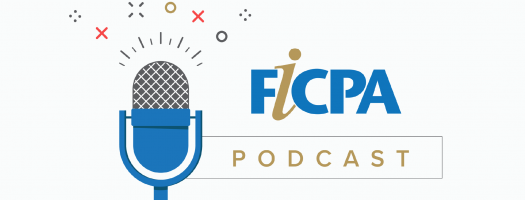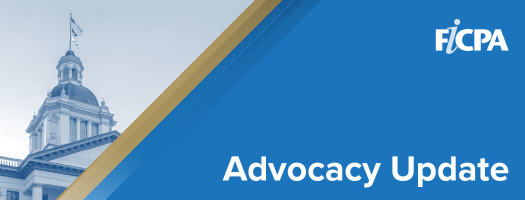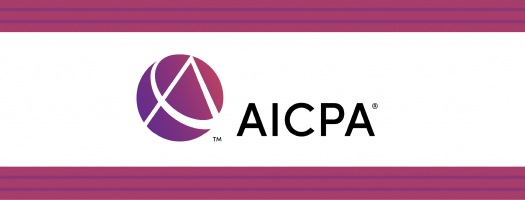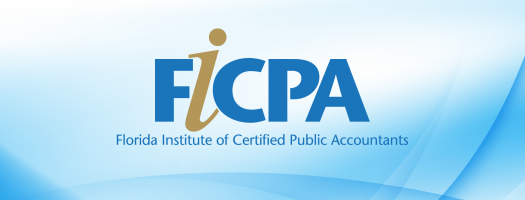Internal Revenue Service
Advocacy Update: FICPA calls for expanded K-2 / K-3 relief
The FICPA on Thursday joined the AICPA and 51 other state societies in calling for the IRS to issue additional K-2 / K-3 filing relief for the 2021 and 2022 tax years.
In our Feb. 25, 2022 edition of Advocacy Update, we cover:
- Our call for expanded K-2 / K-3 relief
- The limited relief the IRS has issued thus far
- AICPA committee chair Jan Lewis' testimony before Congress
- FAQ updates for the 2021 Recovery Rebate Credit
- The FICPA's 2022 Compliance Auditing in Florida Practice Aid
- The status of key legislation in Tallahassee
- And the latest Department of Revenue TIPs
Latest News
FICPA Advocates for Businesses and Practitioners on Schedules K-2, K-3
On Feb. 24, the AICPA and 52 state CPA societies, including the FICPA, sent a letter to Assistant Treasury Secretary Lily Batchelder and IRS Commissioner Charles Rettig regarding widespread concerns about the Schedules K-2 and K-3 reporting.
“The AICPA and state CPA societies across the country call on the Treasury Department and the IRS to delay implementation of the Schedules K-2 and K-3 to 2023 (the 2022 tax year filing season) and to suspend any assessment of penalties against Partnerships or S Corporations for failing to file or failing to timely provide Schedules K-2 and K-3 for the 2021 tax year,” the letter stated.
You may read the full letter here.
The FICPA is strongly supporting these efforts and advocating on members’ behalf to urge the IRS and the Treasury to delay these changes to allow practitioners sufficient time to understand and implement them.
Mid-tax-filing-season updates to the Schedules leads to confusion and unintended errors. Delaying also allows the IRS adequate time to complete the e-File system to accept the new Schedules electronically. The FICPA is also echoing calls to suspend penalties for failing to file, or failing to provide in a timely manner, Schedules K-2 and K-3 for the 2021 tax year.
“While we certainly see the value in streamlining reporting tools and standardized international tax reporting, the FICPA recognizes our members have many concerns regarding the recent revisions to filing instructions on Schedules K-2/K-3,” FICPA President & CEO Shelly Weir said. “The issues raised during this filing season, due to the continual changes regarding filing obligations and the delayed e-File system, necessitate a delay until 2023.”
IRS Provides Details on K-2, K-3 Filing Relief for 2021
In response to calls for relief from the AICPA’s Foreign Partnership Reporting Task Force and the CPA profession at large, the IRS on Feb. 16 provided further details on additional transition relief for certain domestic partnerships and S corporations preparing the new schedules K-2 and K-3.
Notice 2021-39 PDF provides penalty relief for good-faith efforts to adopt the new schedules. Today's transition relief, appearing in new frequently asked questions (FAQs) on Schedules K-2 and K-3, allows an additional exception for tax year 2021 filing requirements by certain domestic partnerships and S corporations.
The IRS is providing an additional exception for tax year 2021 to filing the Schedules K-2 and K-3 for certain domestic partnerships and S corporations. To qualify for this exception, the following must be met:
- In tax year 2021, the direct partners in the domestic partnership are not foreign partnerships, foreign corporations, foreign individuals, foreign estates or foreign trusts.
- In tax year 2021, the domestic partnership or S corporation has no foreign activity, including foreign taxes paid or accrued or ownership of assets that generate, have generated or may reasonably expected to generate foreign source income (see section 1.861-9(g)(3)).
- In tax year 2020, the domestic partnership or S corporation did not provide to its partners or shareholders nor did the partners or shareholders request the information regarding (on the form or attachments thereto):
- Line 16, Form 1065, Schedules K and K-1 (line 14 for Form 1120-S), and
- Line 20c, Form 1065, Schedules K and K-1 (Controlled Foreign Corporations, Passive Foreign Investment Companies, 1120-F, section 250, section 864(c)(8), section 721(c) partnerships, and section 7874) (line 17d for Form 1120-S).
- The domestic partnership or S corporation has no knowledge that the partners or shareholders are requesting such information for tax year 2021.
You may read the IRS alert here.
The AICPA’s Foreign Partnership Reporting Task Force has been tackling K-2 and K-3 issues and questions since the draft forms were released in 2020 and continues to work on behalf of members and taxpayers to try to streamline the reporting process.
The FICPA will watch for additional information about the relief and will push that information to members as soon as it is released.
You can learn more about Schedule K-2 and K-3 concerns via the content linked below.
- Schedules K-2 and K-3 guidance and resources (AICPA Tax Practice & Ethics Team, Feb. 17, 2022; open access)
- Schedules K-2 and K-3 Client Information Letter (AICPA Tax Practice & Ethics Team, Feb. 17, 2022; AICPA member access)
- Advocacy Update: IRS issues K-2/K-3 filing relief for 2021 (Feb. 16, 2022)
- Advocacy Update: Call to Action leads to IRS Relief (Feb. 11, 2022)
- AICPA Town Hall archive
- Federal Tax Update podcast archive
- Navigating the new Schedules K-2 and K-3 (The Tax Adviser, September 2021)
- K2/K3 – Making Sense of New International Passthrough Reporting Requirements (AICPA Podcast on Practitioner Insights, November 2021)
- AICPA Foreign Partnership Reporting Task Force comment letter (September 2020)
AICPA Committee Chair Testifies at Senate Hearing
Late last week, Jan Lewis, AICPA Tax Executive Committee chair, testified in Washington at a Senate Finance Committee hearing, “Spotlighting IRS Customer Service Challenges.”
Her testimony covered multiple issues, including the AICPA’s long-term strategic recommendations to improve IRS service, and recommendations made with the Tax Professionals United for Taxpayer Relief Coalition. As a tax practitioner, Lewis shared specific examples of the problems taxpayers and CPAs are experiencing.
You may read the AICPA press release here and the Journal of Accountancy article here.
IRS Updates FAQs for 2021 Recovery Rebate Credit
On Feb. 17, the IRS updated its frequently asked questions (FAQs) guide for the 2021 Recovery Rebate Credit.
The FAQ (FS-22-12) revisions are as follows:
- 2021 Recovery Rebate Credit — Topic A: General Information: Q3, Q6
- 2021 Recovery Rebate Credit — Topic B: Claiming the Recovery Rebate Credit if you aren’t required to file a 2021 tax return: Q5
- 2021 Recovery Rebate Credit — Topic D: Claiming the 2021 Recovery Rebate Credit: Q6
- 2021 Recovery Rebate Credit — Topic E: Calculating the 2021 Recovery Rebate Credit: Q7, Q18
- 2021 Recovery Rebate Credit — Topic G: Finding the Third Economic Impact Payment Amount to Calculate the 2021 Recovery Rebate Credit: Q2, Q7, Q8
You may read the full IRS 2021 Recovery Rebate Credit Fact Sheet here.
FICPA Publishes 2022 Compliance Auditing in Florida
This month, the FICPA’s State and Local Government Committee published its 2022 Compliance Auditing in Florida Practice Aid.
The guide helps Florida independent auditors understand the compliance issues that may be addressed in an audit of a Florida local government. It provides assistance in testing and reporting compliance matters in connection with audits of Florida's local governmental entities, including counties (all county constitutional officers), municipalities and special districts. The Practice Aid does not include district school boards.
The Practice Aid provides listings or examples of statutory and other legal references pertinent to the audits of the respective types of Florida local governmental entities. The publication does not represent or establish professional standards in auditing and is not an authoritative professional reference source. It should be used only in conjunction with generally accepted auditing standards and other authoritative guidelines.
You may read the 2022 Compliance Auditing in Florida Practice Aid here.
2022 Bill Tracker
SB 1090: Corporate Income Tax by Sen. Joe Gruters
Referred to Finance and Tax; Appropriations
Adopts the 2022 version of the Internal Revenue Code for purposes of the state corporate income tax code; revises the timeframe during which the adjustment of the corporate tax rate based on net collections exceeding adjusted forecasted collections applies; provides for retroactive operation; provides applicability for adjustments taxpayers must make to adjusted federal income with respect to bonus depreciation, etc.
Effective Date: Upon becoming a law.
Status: In appropriations
SB 1382: Tax Administration by Senator Joe Gruters
Referred to Community Affairs; Finance and Tax; Appropriations
Prohibits taxpayers from submitting certain records in tax proceedings under certain circumstances; authorizes the Department of Revenue to respond to contact initiated by taxpayers to discuss audits; clarifies conditions for application of an exemption for sales taxes for certain nonresident purchasers of boats or aircraft; deletes a tax exemption for building materials used in the rehabilitation of real property located in an enterprise zone; revises the period in which, and conditions under which, the executive director of the department may adopt emergency rules; excludes certain benefit charges from the employer reemployment assistance contribution rate calculation, etc.
Effective Date: July 1, 2022
Status: CS by Finance and Tax Committee; read first time
On Committee agenda – Appropriations, Feb. 28, 2022
SB 1276: Legislative Review of Proposed Regulation of Unregulated Functions by Senator Manny Diaz
Referred to Regulated Industries; Governmental Oversight and Accountability; Rules
Provides that certain requirements must be met before adopting the regulation of an unregulated profession or occupation or the substantial expansion of regulation of a regulated profession or occupation; requires the proponents of legislation that proposes such regulation to provide certain information to the state agency that would have jurisdiction over the proposed regulation and to the Legislature by a certain date; requires such state agency to provide certain information to the Legislature within a specified timeframe; provides an exception, etc.
Effective Date: July 1, 2022
Status: Introduced
SB 1302: Criminal History Information by Sen. Danny Burgess
Referred to Regulated Industries; Appropriations Subcommittee on Criminal and Civil Justice; Appropriations
Prohibits an applicable board, or the Department of Business and Professional Regulation if there is no such board, from inquiring into or considering the conviction history of an applicant for licensure until it is determined that the applicant is otherwise qualified; prohibiting the applicable board, or the department if there is no board, from denying an application for licensure of a person based solely or in part on an applicant’s criminal history; provides requirements for determining if such criminal history directly relates to the practice of the applicable profession; provides requirements for court-ordered sealing of certain records that were automatically sealed by the Department of Law Enforcement under specified provisions, etc.
Effective Date: July 1, 2022
Status: Favorable by Appropriations Subcommittee on Criminal and Civil Justice - YEAS 7, NAYS 0
On Committee agenda – Appropriations, Feb. 28, 2022
To view more legislation the FICPA is tracking during the 2022 Legislative Session, log in to your member account and visit our Advocacy Action Center.
2022 Legislative Session: Important Dates
- Feb. 26: All bills are immediately certified
- March 1: 50th-day rule (Senate) – last day for regularly scheduled committee meetings
- March 10: After the 58th day (March 9) of a regular session, the House may consider only returning messages, conference reports and concurrent resolutions
- March 11: 60th day – last day of Regular Session
DOR TIPs
The Florida Department of Revenue has published these helpful Tax Information Publications (TIPs) in 2022.
Administration
New Worlds Reading Initiative Tax Credit and Strong Families Tax Credit
Feb. 7, 2022
Florida’s New Worlds Reading Initiative was established in 2021 under the Florida Department of Education to improve literacy skills and promote a love of reading by providing high-quality, free books to students in kindergarten through fifth grade who are reading below grade level. Florida’s Strong Families Tax Credit was established in 2021 under the Florida Department of Children and Families to provide services to prevent child abuse, engage absent fathers in being more active in their children’s lives, provide books to eligible children, and assist families of children with chronic illness.
Communications Services Tax
Change in Local Communications Services Tax Rate Beginning May 1, 2022
Jan. 27, 2022
Beginning May 1, 2022, the local communications services tax (CST) rate for the Town of Astatula will change. The total local CST rate includes: (1) the local rate imposed under the CST statute; and (2) any county discretionary sales surtax imposed under the sales and use tax statute.
Corporate Income Tax
Florida Corporate Income Tax 2022 Automatic Refund
Jan. 13, 2022
An automatic refund is available for Florida corporate income/franchise tax returns filed on or before Feb. 1, 2022, for taxable years beginning on or after April 1, 2019, and on or before March 31, 2020 (subject to any 2022 law change). For most taxpayers, this will be the return for taxable year ending Dec. 31, 2020.
Florida Corporate Income/Franchise Tax – Internship Tax Credit Program
Jan. 4, 2022
For taxable years beginning during the 2022 and 2023 calendar year, a student internship tax credit is available against the Florida corporate income/franchise tax. The Florida Internship Tax Credit Program (Program) allows credit for up to five student interns per taxable year, per corporation. The credit amount is $2,000 per student intern (maximum of $10,000 for each taxable year). A total of $2.5 million in credits are available for each of the two years of the Program.
Intangible Tax
2022 Governmental Leasehold Intangible Tax Valuation Factor Table
Jan. 5, 2022
Florida law provides that all leasehold estates or related possessory interest in property of the United States, the State of Florida or any of its political subdivisions, municipalities, agencies, authorities or other governmental units are taxed as intangible personal property if the leased property is undeveloped or predominantly used for a residential or commercial purpose and rental payments are due in consideration of the leasehold estate or possessory interest. Unless the leasehold estate qualifies for specific exemptions, lessees of governmentally owned property are required to file an annual intangible tax return.
Sales and Use Tax
Madison County Increases Its Tourist Development Tax Rate From 3% to 5%
Jan. 5, 2022
The Madison County Board of County Commissioners adopted Ordinance No. 2021-246 increasing the tourist development tax rate from 3% to 5% on transient rental transactions occurring in Madison County.
Contribute
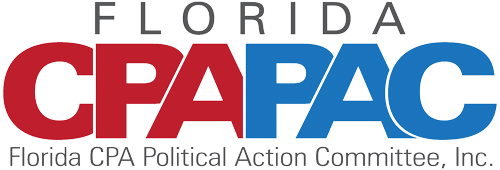
The Florida CPA/PAC supports the politicians who stand up for CPAs. We back the candidates and incumbents who will ensure CPAs and their clients are included in the legislative process. It is your voluntary contributions that help protect the CPA license.
Please note: Contributions are strictly voluntary and are not deductible for federal tax purposes. The Florida CPA/PAC is an entity completely separate from the FICPA. The Florida CPA/PAC is supported solely by the voluntary contributions of members of the FICPA and others.
Advocacy Update: Call to action leads to IRS relief
As the Legislative Session continues to make news here in Florida, the FICPA, other state organizations and the AICPA influenced national policy this week, successfully advocating for additional taxpayer relief from the IRS.
In our Feb. 11, 2022, edition of Advocacy Update, we cover:
- The IRS' suspension of automatic collection notices
- Our profession's ongoing advocacy efforts in the face of IRS service challenges
- Melanie Griffin's confirmation as Secretary of the Florida DBPR
- The status of key legislation in Tallahassee
- Recent DOR updates, and more
Latest News
IRS suspends automatic collection notices
In response to a call from the FICPA, other state societies and the Taxpayer Relief Coalition, the IRS on Wednesday suspended more than a dozen additional letters, including the mailing of automated collection notices normally issued when a taxpayer owes additional tax and the IRS has no record of a taxpayer filing a tax return. These mailings include balance-due notices and unfiled tax return notices.
You can read the full IRS news release here.
The FICPA worked with the AICPA and members of the Florida Congressional Delegation, requesting their signatures on a bipartisan letter asking the U.S. Treasury Department for improvements and taxpayer relief during the 2022 filing process.
The table below outlines the notices that have been suspended.
Individual Taxpayer Notices
| Notice/Letter Number | Title | Description |
|---|---|---|
| CP80 | Unfiled Tax Return | This notice is generally sent when the IRS credited payments and/or other credits to a taxpayer’s account for the tax period shown on the notice, but the IRS hasn’t received a tax return for that tax period. |
| CP59 and CP759 (in Spanish) | Unfiled Tax Return(s) - 1st Notice | IRS sends this notice when there is no record of a prior year return being filed. |
| CP516 and CP616 (in Spanish) | Unfiled Tax Returns – 2nd Notice | Request for information on a delinquent return as there is no record of a return filed. |
| CP518 and CP618 (in Spanish) | Final Notice – Return Delinquency | This is a final reminder notice when there is no record of a prior year(s) return filed. |
| CP501 | Balance Due – 1st Notice | This notice is a reminder that there is an outstanding balance on a taxpayer’s accounts. |
| CP503 | Balance Due – 2nd Notice | This notice is the second reminder that a there is an outstanding balance on a taxpayer’s accounts. |
| CP504 | Final Balance Due Notice - 3rd Notice, Intent to Levy | The IRS sends this notice when a payment has not been received for an unpaid balance. This notice is a Notice of Intent to Levy (Internal Revenue Code Section 6331 (d)). |
| 2802C | Withholding Compliance letter | This letter is mailed to taxpayers who have been identified as having under-withholding of Federal tax from their wages. This letter provides instructions to the taxpayer on how to properly correct their tax withholding. |
Business Notices
| Notice/Letter Number | Title | Description |
|---|---|---|
| CP259 and CP959 (in Spanish) | Return Delinquency | IRS sends this notice when there is no record of a prior year return being filed. |
| CP518 and CP618 (in Spanish) | Final Notice – Return Delinquency | This is a final reminder notice that we still have no record of a prior year tax return(s). |
Webinar, Hearing Underscore Tax Filing Relief Efforts
During the AICPA’s Feb. 8 webinar, “Is Help on the Way from the IRS for this Filing Season?” stakeholders discussed issues taxpayers and tax practitioners face as they enter a third filing season during the COVID-19 pandemic. Participants learned about the coalition’s recommendations that the group believes the IRS is able to immediately implement to provide relief to taxpayers and practitioners. The discussion included steps the coalition is taking, including conversations on Capitol Hill, to ensure the recommendations are adopted. Finally, stakeholders discussed their suggestions to help practitioners navigate a challenged tax-administration system.
In an additional effort, on Feb. 8, National Taxpayer Advocate Erin Collins participated in an oversight hearing with the U.S. House Ways and Means Committee regarding challenges taxpayers face for the 2022 filing season.
Among the hearing speakers was Congresswoman Judy Chu, author of the recent bipartisan letter to the Treasury Department urging the Department to bring immediate relief to filers by reducing the need to contact the IRS. The FICPA called on Florida Congressional representatives to support the letter.
The hearing included an update from Collins on IRS services and a discussion about the IRS’ transition away from the use of facial recognition technology.
“To allow taxpayers access to the IRS online accounts, there are serious privacy concerns with the use of this technology,” Committee Chairman Bill Pascrell said. “I look forward to working with the IRS and the Administration to find solutions that balance the need for identity-theft protections against privacy concerns raised by this technology.”
Town Hall Covers K-2/K-3 Disclosure Requirements
Many FICPA members also have asked questions and expressed concerns about the recent IRS announcement regarding Schedules K-2 and K-3 disclosure requirements.
The AICPA’s Foreign Partnership Reporting Task Force has been tackling K-2/K-3 issues and questions since the draft forms were released in 2020 and continues to work on behalf of members and taxpayers to try to streamline the reporting process. However, members need to be aware of the reporting requirements for their passthrough entity clients (partnerships and S corporations).
Lisa Simpson, AICPA vice president – firm services, discussed the K-2/K-3 issue in the AICPA’s Feb. 3 Town Hall.
Here are related resources:
- Navigating the new Schedules K-2 and K-3 – The Tax Adviser, September 2021
- K2/K3 – Making Sense of New International Passthrough Reporting Requirements – AICPA Podcast on Practitioner Insights
- AICPA Foreign Partnership Reporting Task Force comment letter (September 2020)
Senate Confirms DBPR Secretary Melanie Griffin

On Feb. 8, the Florida Senate Committee on Regulated Industries confirmed Melanie Griffin as secretary of the Florida Department of Business and Professional Regulation.
“In many ways, this opportunity was never a given,” Secretary Griffin said. “Having first been told it was not financially possible for me to attend my dream school, The Florida State University, generous donors funded scholarships that made it possible for me to receive my finance degree from FSU. Thank you to everyone that invested in me, and please note that I’ve paid it forward by mentoring hundreds of students and young professionals to give them the same chance that I have had, thanks to generous donors.”
Griffin, of Tampa, is an Attorney with Shumaker, Loop & Kendrick and senior advisor for business-to-business relationships for Shumaker Advisors Florida. She is also the Founder and Owner of Spread Your Sunshine, a business that provides speaking and professional-training services; and designs, manufactures and sells inspirational products and gifts. Griffin is president of the Hillsborough Association of Women Lawyers Executive Board of Directors; serves on the Florida State University College of Law Board of Visitors; and is a Fellow of The Florida Bar Foundation. She earned her bachelor’s degree in finance, master of business administration and juris doctor degree from Florida State University.
“Since law school I’ve been a business attorney for just shy of about 15 years, and I also am a small business owner, which give me a unique perspective on government, and how we can better serve our clients and constituencies,” Griffin said. “I am now officially in month two on the job, and honored to work with Gov. DeSantis and our team at the agency to play such a critical role in growth and professional success for so many Floridians.
“This session we are working to increase operational efficiencies and enhance levels of service for licensees with new, technology-focused ideas,” Griffin said. “The Governor’s Freedom First budget included major investments that would modernize the technological capabilities of DBPR and minimize the burdens of government processes by delivering new, meaningful long-term benefits for all of the industries licensed and regulated by DBPR.”
We warmly congratulate Secretary Griffin and look forward to continuing our longstanding partnership with DBPR.
CPA Evolution will impact today’s interns; how can firms prepare?
As we head into the 2022 “intern” season for firms, CPA Evolution recently published a new article: CPA Evolution will impact today’s interns; how can firms prepare?
The article, written by Carl Mayes, AICPA senior director – audit & accounting quality, is targeted to public accounting firm leaders as they consider their hiring and training plans for 2022. It highlights what firms need to consider to attract candidates, and how firms can assist universities as they make curriculum changes in advance of the new CPA exam, to be released in January 2024.
2022 Bill Tracker
SB 1090: Corporate Income Tax by Sen. Joe Gruters
Referred to Finance and Tax; Appropriations
Adopts the 2022 version of the Internal Revenue Code for purposes of the state corporate income tax code; revises the timeframe during which the adjustment of the corporate tax rate based on net collections exceeding adjusted forecasted collections applies; provides for retroactive operation; provides applicability for adjustments taxpayers must make to adjusted federal income with respect to bonus depreciation, etc.
Effective Date: Upon becoming a law.
Status: In appropriations
SB 1382: Tax Administration by Senator Joe Gruters
Referred to Community Affairs; Finance and Tax; Appropriations
Prohibits taxpayers from submitting certain records in tax proceedings under certain circumstances; authorizes the Department of Revenue to respond to contact initiated by taxpayers to discuss audits; clarifies conditions for application of an exemption for sales taxes for certain nonresident purchasers of boats or aircraft; deletes a tax exemption for building materials used in the rehabilitation of real property located in an enterprise zone; revises the period in which, and conditions under which, the executive director of the department may adopt emergency rules; excludes certain benefit charges from the employer reemployment assistance contribution rate calculation, etc.
Effective Date: July 1, 2022
Status: CS by Finance and Tax Committee - YEAS 7, NAYS 0
Pending reference review under Rule 4.7(2) - (Committee Substitute)
SB 1276: Legislative Review of Proposed Regulation of Unregulated Functions by Senator Manny Diaz
Referred to Regulated Industries; Governmental Oversight and Accountability; Rules
Provides that certain requirements must be met before adopting the regulation of an unregulated profession or occupation or the substantial expansion of regulation of a regulated profession or occupation; requires the proponents of legislation that proposes such regulation to provide certain information to the state agency that would have jurisdiction over the proposed regulation and to the Legislature by a certain date; requires such state agency to provide certain information to the Legislature within a specified timeframe; provides an exception, etc.
Effective Date: July 1, 2022
Status: Introduced
SB 1302: Criminal History Information by Sen. Danny Burgess
Referred to Regulated Industries; Appropriations Subcommittee on Criminal and Civil Justice; Appropriations
Prohibits an applicable board, or the Department of Business and Professional Regulation if there is no such board, from inquiring into or considering the conviction history of an applicant for licensure until it is determined that the applicant is otherwise qualified; prohibiting the applicable board, or the department if there is no board, from denying an application for licensure of a person based solely or in part on an applicant’s criminal history; provides requirements for determining if such criminal history directly relates to the practice of the applicable profession; provides requirements for court-ordered sealing of certain records that were automatically sealed by the Department of Law Enforcement under specified provisions, etc.
Effective Date: July 1, 2022
Status: Voted favorable by Regulated Industries - YEAS 8, NAYS 0
In Appropriations
To view more legislation the FICPA is tracking during the 2022 Legislative Session, log in to your member account and visit our Advocacy Action Center.
2022 Legislative Session: Important Dates
- Feb. 26: All bills are immediately certified
- March 1: 50th-day rule (Senate) – last day for regularly scheduled committee meetings
- March 10: After the 58th day (March 9) of a regular session, the House may consider only returning messages, conference reports and concurrent resolutions
- March 11: 60th day – last day of Regular Session
DOR TIPs
Since the last issue of Advocacy Update, the Florida Department of Revenue has published these helpful Tax Information Publications (TIPS).
Administration
New Worlds Reading Initiative Tax Credit and Strong Families Tax Credit
Feb. 7, 2022
Florida’s New Worlds Reading Initiative was established in 2021 under the Florida Department of Education to improve literacy skills and promote a love of reading by providing high-quality, free books to students in kindergarten through fifth grade who are reading below grade level. Florida’s Strong Families Tax Credit was established in 2021 under the Florida Department of Children and Families to provide services to prevent child abuse, engage absent fathers in being more active in their children’s lives, provide books to eligible children, and assist families of children with chronic illness.
Communications Services Tax
Change in Local Communications Services Tax Rate Beginning May 1, 2022
Jan. 27, 2022
Beginning May 1, 2022, the local communications services tax (CST) rate for the Town of Astatula will change. The total local CST rate includes: (1) the local rate imposed under the CST statute; and (2) any county discretionary sales surtax imposed under the sales and use tax statute.
Contribute

The Florida CPA/PAC supports the politicians who stand up for CPAs. We back the candidates and incumbents who will ensure CPAs and their clients are included in the legislative process. It is your voluntary contributions that help protect the CPA license.
Please note: Contributions are strictly voluntary and are not deductible for federal tax purposes. The Florida CPA/PAC is an entity completely separate from the FICPA. The Florida CPA/PAC is supported solely by the voluntary contributions of members of the FICPA and others.
